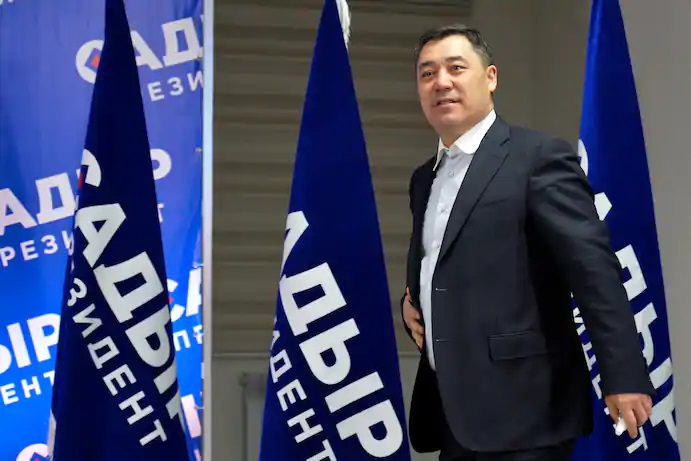Three months after protesters in Kyrgyzstan stormed its main government building, the country’s third uprising in 15 years, a convicted kidnapper solidified his grip on power there late Sunday, easily winning a snap presidential election. But he faces a raft of challenges.
Populist Sadyr Japarov, 52, secured nearly 80 percent of the vote, according to Kyrgyzstan’s election commission. He had been serving a long prison sentence for kidnapping a provincial governor, a charge he says was politically motivated, but supporters broke him out in October. Within days, he filled the power vacuum precipitated by the violent protests, serving as interim president before running for the post full time.
In the same vote this past weekend, a proposal to shift more power to the president and away from parliament received more than 80 percent support, the election commission said. Voters were not offered details of what the change would entail but simply asked to choose between a parliamentary system of governance and a presidential one.

Despite the apparent mandate for Japarov, however, analysts expressed pessimism Monday that the results presage long-term political stability for Central Asia’s lone democracy.
“Unfortunately, I predict more turmoil in Kyrgyzstan,” said Erica Marat, an associate professor at the National Defense University’s College of International Security Affairs in Washington.
“For the next couple of months, we may see some stability and euphoria among Japarov’s supporters — and there is quite a formidable support base — but he was able to basically jump from prison to president because so many were disappointed in the previous president, with the economy in decline and the pandemic really hitting the country hard this summer,” she said.
But Marat added that she expects discontent to materialize when Japarov inevitably struggles to deliver on his grand campaign promises, particularly the one about reversing Kyrgyzstan’s economic woes. He came to prominence for saying he would nationalize the giant Kumtor gold mine operated by Canada’s Centerra Gold — a pledge he’s already backed off.
Clan rivalry and regional divisions have led to a turbulent political environment in the mountainous former Soviet republic of about 6.5 million. Revolts in 2005 and 2010 similarly toppled presidents before Sooronbay Jeenbekov was forced out in October. Dissatisfaction with the government’s response to the coronavirus pandemic and allegations of vote-buying and fraud in parliamentary elections on Oct. 4 triggered riots in the capital, Bishkek, leading to the elections’ annulment.

Japarov could be looking to quash the perpetual unrest with his proposal to alter Kyrgyzstan’s constitution to give the president more power, a political model more like that of neighboring Kazakhstan and Uzbekistan, which have been ruled by strongmen since the breakup of the Soviet Union.
“I am assuming power at a time of hardship and crisis,” Japarov told reporters Sunday.
“One or two years will not be enough to fix everything,” he said. “We can do it in three or four years, and it will require stability.”
Kyrgyzstan is strategically wedged between Russia and China, and its economy is dependent on investment and trade with both powers. Japarov said he would pursue closer ties with Moscow, which operates a military base near Bishkek.
Russian President Vladimir Putin was critical of Kyrgyzstan’s political model during his news conference in December; he said the country’s elites are trying “to fit their domestic policy into the mold of some Western countries” while lacking the kind of “political consciousness and institutional maturity” of a country like France.
Voter turnout on Sunday was low — 39 percent compared with 55 percent in the last presidential election — and there were some reports of voting irregularities. Japarov’s campaign was a mix of populism — he promised to increase health-care spending — and nationalism, such as his move to add ethnicity information to national ID cards after he came to power in the fall.

Marat, of the National Defense University, described Japarov as the Kyrgyz version of President Trump, noting his populist stance and the personality cult that has developed around him.
“He doesn’t seem to be a very capable policymaker,” she said. “There were a couple of interviews where he was even confused about branches of government. He couldn’t name them.”
Japarov’s critics have accused him of having links to organized crime, which he has denied. He was able to consolidate power in part by rushing the snap election, setting the Jan. 10 date just a month earlier, which left little time for opposing candidates to mount campaigns or for the public to understand the proposed constitutional change.
Asel Doolotkeldiev, a Bishkek-based analyst, wrote on Twitter that the vote’s legitimacy is “highly questionable.”
“My entire adult life in Kyrgyzstan was organized by hopes from one election to another, from one ‘revolution’ to another,” she said. “I am not dramatizing. I just want to live as a normal person, in a normal country. Maybe someone from Norway, Finland or Iceland can adopt me?”
“Washington Post”
By Isabelle Khurshudyan
11.01.21
